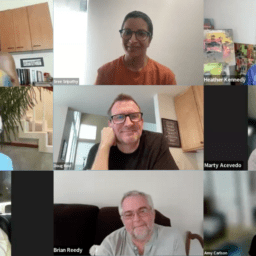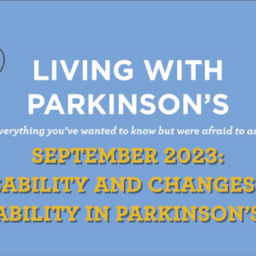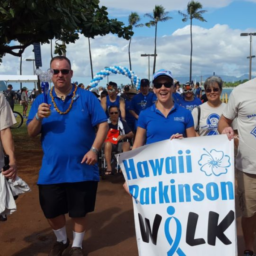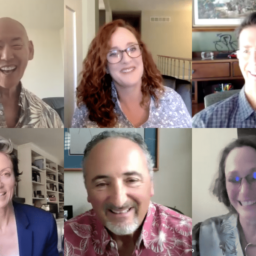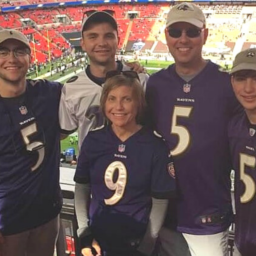Written by Lori DePorter
Navigating life with Parkinson’s is challenging. Adding a job search elevates stress levels, which, in turn, makes it more difficult to manage symptoms. It’s a vicious cycle. So, when life’s circumstances put me on the dreaded “job search,” I was facing an uphill climb. While everyone’s stories and work experiences are different, I share in this post what I learned during my job-hunt-with-Parkinson’s experience.
#1 – The process has changed
The first thing I realized on my search was that the entire process – from searching for opportunities and submitting applications to interviewing – has changed. It was not what I had experienced in the past. I never anticipated the lack of response from a majority of the potential employers. When I did get a response, it was a rejection, and they seemed to be coming in one after the other.
I learned that, as a person with Parkinson’s, the statistics were not in my favor. Trends among people with disabilities in the workplace are looking bleaker; according to the Bureau of Labor Statistics, in 2019, 19.3% of persons with a disability were employed. By 2020, this had decreased to 17.9%.
# 2 – My resume has changed
My search continued to be frustrating. I wanted answers. Why was an interview out of reach? Jobs that I felt were a slam dunk were air balls. What was I missing?
Or perhaps the better question is, what was I including? Parkinson’s. It’s on my resume.
Under the Americans with Disabilities Act (ADA), employees are not required to disclose a disability. And Parkinson’s itself is not necessarily a disability; this depends on your unique symptoms and experiences. With different Parkinson’s experiences, our needs are different, and so are our decisions about disclosing our diagnoses. If and when to disclose your Parkinson’s is a personal decision, but be sure to do your research and explore your rights under the ADA.
#3 – There’s a lack of transparency, and that felt wrong for me
I learned that many people with disabilities, including Parkinson’s, are not transparent about their challenges in the workplace. A study by Accenture, Enabling Change found that both executives and employees are keeping their disabilities close, and executives were less likely to be open with others in the workplace.
 I didn’t keep my Parkinson’s a secret. When the rejections continued to roll in, I started to reply and ask for feedback. So far, I have had two human resource representatives suggest that I look at my resume and cover letter. I did. And those parts of my story are not going to change.
I didn’t keep my Parkinson’s a secret. When the rejections continued to roll in, I started to reply and ask for feedback. So far, I have had two human resource representatives suggest that I look at my resume and cover letter. I did. And those parts of my story are not going to change.
My experiences in my life with Parkinson’s are part of my resume. To exclude them would not be a true representation of the last six years.
While most of my requests for feedback went unanswered, the Davis Phinney Foundation gave me the opportunity to be a freelance contributor. This, together with my role as a columnist for Parkinson’s News Today, allows me to be transparent — I have Parkinson’s.
#4 – Not all employers and organizations are created equal
Perhaps the answer is more about where to send a resume. There are companies where an inclusive workplace is an intentional part of their business plan. Companies that are acknowledging the research of studies like the one by Accenture, Getting to Equal: The Disability Inclusion Advantage. This study reflects the positive impact the disabled community can have on a company, including increased innovation and market share to an enhanced reputation.
“Thankfully, over time, many employers have come to understand that these perceptions are untrue. And new research strongly suggests that the opposite — that hiring people with disabilities is good for business.”
Ted Kennedy, Jr., New York Times, 2018
Many of these companies are certified B Corporations. While they are for-profit companies, they are also driven by a social mission. They must meet requirements set by B-Lab, the nonprofit company that administers B Corporation certifications.
Diversity, equity, and inclusion (DEI) are increasingly important in many workplaces and is becoming a priority for both employers and employees. As a potential employee, look for employers who create a welcoming environment for all. You have unique abilities and talents. Find a workplace where they will be welcomed and accepted!
#5 – It takes time. The Parkinson’s community can make a difference
As a community, people with Parkinson’s are a force of nature. As potential employees, we have invaluable talent and skills to offer. As consumers, we are an influential market. There are organizations that understand this. (For example, to date, there are more than 3500 certified B-Corporations in over 70 countries.)
It’s up to us to find them.
learn more about employment and parkinson’s
How to Work Full Time and Live Well with Parkinson’s
Working, Ambition, and Parkinson’s
YOPD Council Webinar Recording: Work, Money, Meaning, and Parkinson’s
Working Full-Time with Young Onset Parkinson’s
Job Accommodation Network – Parkinson’s
Financial Wellness and Parkinson’s
Sharing Your Parkinson’s Diagnosis at Work
Talking about Parkinson’s at Work





